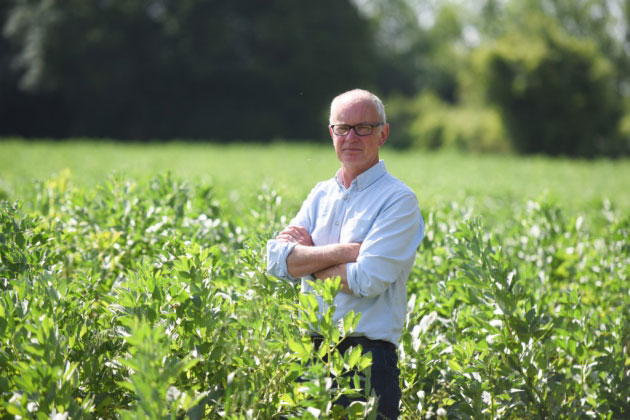John Pawsey is a fourth generation arable and (more recently) sheep farmer in a part of Suffolk overwhelmingly dominated by conventional non-organic farming. He converted to organic in 1999 and, until this week, was the chairman of the NFU’s organic forum. He tells Jack Thompson about why he chose to leave conventional methods behind, the creative side of organic farming and the intrigue he managed to stir in his local farming community.
So John, could you tell us a bit about what led you to convert to organic?
John Pawsey (JP): At the time the farm was struggling to make any money and I felt the business model was broken. I was becoming increasingly uneasy with constantly applying chemicals to the soil without really understanding the long-term effects. So I decided to stop using them all together and go organic.
Deciding to convert, was it a business decision or one of the heart?
JP: I would say that it was first and foremost a business decision but if you can make a business decision and go down a route that you naturally feel more at home with, it’s bound to be a success.

And a success it was, financially speaking. Why do you think there aren’t more farmers that follow your suit?
JP: Farmers are generally risk averse. Also, farmers worry about the long-term, intergenerational relationships they have developed with the chemical reps, and when you go organic, you lose that support network overnight. They would feel cast out into a no man’s land, with no help and no advice. But for me that was one of the most exciting things about it, I felt that it was much more creative, artistic even, in the choices I was making.
Could you expand on the creative side of farming organically?
JP: It was liberating because, first of all you weren’t tied into all these relationships with all these people trying to sell you something. Also the organic community are thinking outside of the box, and doing something very different, and not just farming. I felt more at home with those sorts of people. We’ve been organic for 20 years and I am still challenged every single day and have to devise creative solutions to our problems. Some people don’t like that but I love it.

You mention that you are the only organic grower in your area, what was the reaction like when you decided to convert?
JP: A lot of amusement really – you do get quite a lot of comments. You get all the stereotypical comments of what they think an organic farmer is like; sandal wearing, goatee bearded. However, for the most part it was fascination. Before we converted we didn’t do any farm walks; now we do over 25 a year and most of those are non-organic farmers, curious about organic techniques. Then there are one or two who feel threatened by it: it’s a very small minority but they challenge you on everything. But that’s all part of it and we should all be challenged on our positions anyway.
And how did you prepare for life as an organic farmer before your conversion?
JP: The first thing I had to do was sell my sprayer, and that was an absolute joy. Freeing up that time I would normally spend on my sprayer allowed me to get to know my farm again. I was looking, observing, understanding the challenges ahead.
Do you think we’ve lost that to a degree, that ability to understand one’s land?
JP: Yes I do, the analogy I use is, someone who repairs cars is called a mechanic, they have a deep mechanical knowledge and if they looked at the alternator, they would understand all the components of the alternator. Nowadays they’re just fitters, because they don’t actually understand how the alternator works, all they do is unbox a new alternator and fit it in.
In this way we have deskilled our farmers, they are lacking confidence, because someone, be it the chemical reps, the fertiliser reps, the agronomists, are making the decisions for them, so they’ve become like the fitters, taking one thing and applying it to the farm without really understanding how the whole thing works. Having to have a greater knowledge of that is really exciting.

And are you observing tangible improvements to local wildlife and fauna?
JP: Yes, we have different independent wildlife surveys carried out every year on everything from grass and weeds, to birds and invertebrates. Not only did we have more species across the board, but more numbers too. The contrast with the neighbouring farms was staggering; the survey representative said it was like an oasis in the middle of a desert.
That is incredible that you’re seeing such changes. Do you think that this aspect is lacking in the organic marketing?
JP: For me, as someone who is deeply connected to my land, the most important thing is biodiversity, in all senses of the world. If you could see the difference in our farm compared to our neighbours, this is the real undeniable benefit. People generally want to pay for health benefits, rather than environmental benefits. But the biodiversity is the aspect I can absolutely prove; turning a sterile part of Suffolk into one that is brimming with wildlife. That is why I buy organic food.










great interview, full of positivity and hope for agriculture’s way forward. It is amazing how quickly wildlife returns as soon as it can find what it needs…